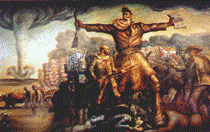History, Department of

James A. Rawley Graduate Conference in the Humanities
Date of this Version
April 2008
Document Type
Article
Abstract
Beginning in 2003, grassroots quiltmaking projects were founded in the United States in response to Operation Enduring Freedom and Operation Iraqi Freedom. Marine Comfort Quilts, founded by Jan Lang, Operation Homefront Quilts, founded by Jessica Porter, and Home of the Brave Quilt Project, founded by Donald Beld, each endeavor to make and give memorial quilts to each family of America’s fallen in these wars. Each project involves a community of volunteers scattered across the nation, many who have never met each other but who communicate through various communications technologies.
Oral history interviews were conducted with the founders of the three projects listed above and with other quiltmakers who are active within them in order to understand the meanings of making and giving quilts and the meanings of quilts as messengers of comfort and care from quiltmakers to grieving military families. Two primary sites of meaning were identified: 1) the internal motivations that inspired quiltmakers to begin and continue participation in a quiltmaking project; and 2) the textual, symbolic, and personal messages invested in and inherent within the quilts. These form a meaning-making process that effectively delivers the messages of comfort and care in spite of the social and geographical distance between quiltmakers and the military families.


Comments
Paper presented at the 3rd Annual James A. Rawley Conference in the Humanities — Imagining Communities: People, Places, Meanings. Lincoln, Nebraska, April 12, 2008. Sponsored by the University of Nebraska–Lincoln History Graduate Students’ Association. Copyright © 2008 Jonathan Gregory.